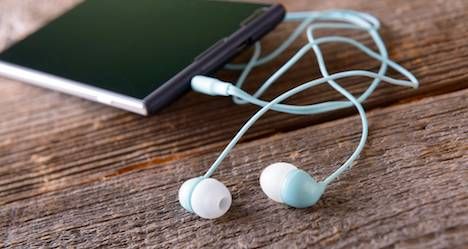
Audiobooks Help Me Cope
Nine months ago I moved from New York to Seattle. I found a job, packed up thirty boxes of books (among other, less important items), and flew across the country. I left behind my family, a job and a city I’d occupied for three years. My nuclear family has always lived in New York. My extended family is also clustered on the east coast. In an emergency, only the tristate area traffic stands in the way of getting to each other. My niece—the first of our family’s next generation—was less than six months old when I moved.
All of which is to say, despite having friends in the city I moved to and a partner and cat who came with, moving was the biggest change I’ve made in my life thus far—and I’m not great with change. The adjustment has been difficult. I’ve felt homesick, lonely, anxious, panicked, depressed. I’ve felt ridiculous, dramatic, burdensome, annoying. I’ve felt torn in two.
I’ve always turned to books with my problems—whether a nine year-old learning to play basketball or a nineteen year-old coping with the stress of college, books are my safety blanket. If I’m so stressed I can’t even function, I drop everything and just dive into a book. You know what I’m talking about.
So I figure there must be some correlation to my moving and a significant, if unintentional, uptick in my audiobook consumption. I started listening to three or four a month after moving.
Audiobooks are immersive in a way that hardcopies aren’t. When I’m enjoying an audiobook, I listen to it near-constantly—while in the shower, doing chores, playing video games, completing rote tasks. The narrator sticks with me—sometimes I’ll pick up their tone or turns of phrase and integrate them into my own speech patterns. If I’m lonely or homesick, or I just don’t want to think, the audiobook keeps me company.
My audiobook choices tend towards nonfiction; I love deep-diving into a subject I know little about. And, while I’m an intensely emotional person, I find comfort in facts and logic, using them as a shield when I simply can’t grapple with my own issues. Lafayette in the Somewhat United States taught me more about early US history than high school ever did, and Sarah Vowell (author and narrator) made me laugh out loud pretty much every chapter. Weapons of Math Destruction by Cathy O’Neil taught me about algorithms, big data, and the injustices being built into our technology. It was grim and terrifying at times, but it equipped me with a knowledge and awareness I didn’t realize I needed. Evicted by Matthew Desmond threw my own problems in stark contrast to the real struggles of people who can’t even keep a roof over their heads. It was not at all uplifting, but it made me check my privilege and fueled me with a desire to learn more and help others.
I also delved into the more personal side of nonfiction. Tiny Beautiful Things by Cheryl Strayed, a collection of Strayed’s advice column Dear Sugar, gave me perspective and tools to answer my own calls for help—”What would Sugar say?” is not a bad mantra to keep in your pocket for hard or confusing times. I also binged on memoirs—The Misadventures of Awkward Black Girl by Issa Rae, Shirley Jackson’s Life Among the Savages and Raising Demons, You Can’t Touch My Hair by Phoebe Robinson, Shrill by Lindy West. I was drawn to memoirs by women; our lives were different in the details, but I found comfort in their stories, the recurring themes of womanhood I see in my own life, and their trials and errors.
When I was at my worst—questioning life choices big and small, unable to motivate myself out of bed in the morning, crying for no reason—humorous memoirs of mental health and depression helped the most. Jenny Lawson’s Let’s Pretend This Never Happened and Furiously Happy talk in depth about Lawson’s anxiety, depression, and other mental and physical health issues. You might expect such stories made me feel worse, but she approaches them with such humor and strength I felt inspired. Also, it’s hard to feel sad when you’re laughing so hard. So Sad Today by Melissa Broder had a similar effect—listening to that audiobook was like getting a wonderfully warm and comforting hug from a naked stranger. She lays herself bare and makes you laugh even as you’re cringing.
Audiobooks have taught me my problems are small, conquerable. They’ve helped me laugh when I feel like crying. They are a friendly voice in my head when I need a break from my own thoughts. And I’m always looking for more suggestions, so if you’ve also turned to audiobooks in times of emotional crises I’d love to hear which have helped.














